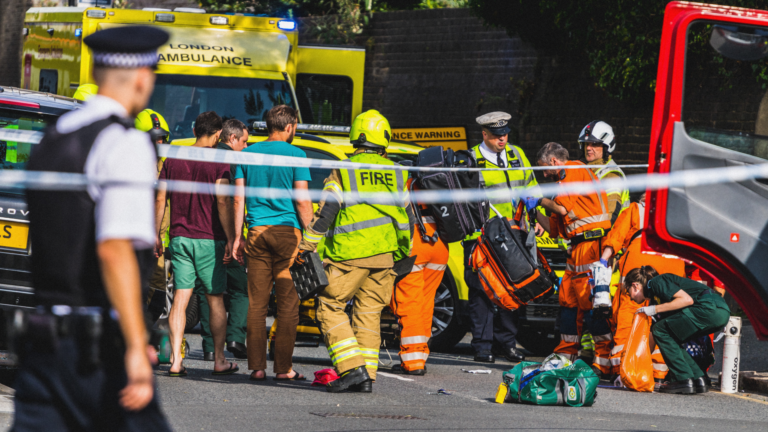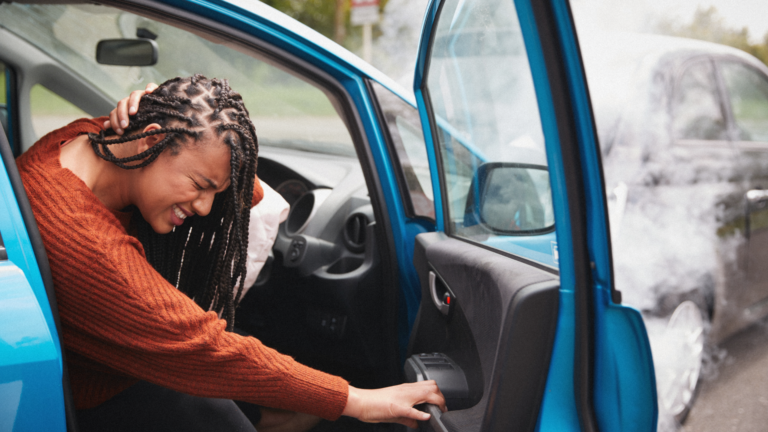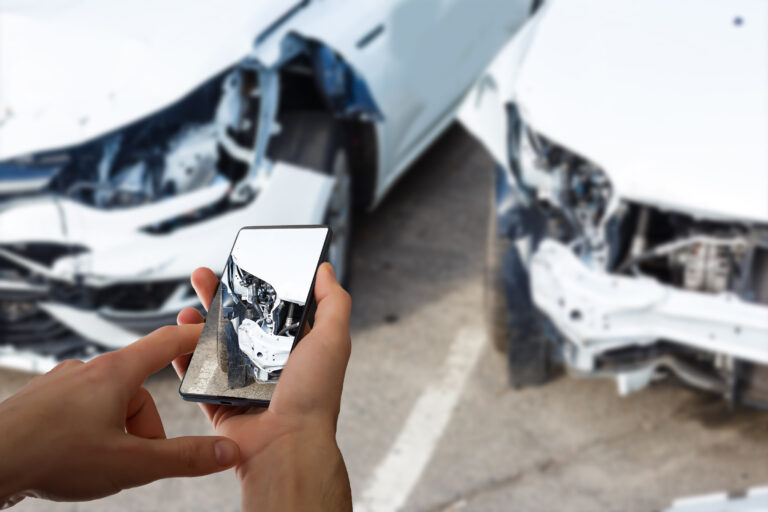Injured at an Atlanta intersection? Our Georgia-licensed personal injury lawyers investigate fast, secure APD crash reports and red-light camera footage, and deal directly with insurance adjusters so you don’t have to. We serve Atlanta and nearby Fulton, DeKalb, Cobb, and Gwinnett counties. Get a free consultation and pay nothing unless we win. Call now to protect evidence and your right to compensation.
Get Your Free Consultation Today
Don’t wait to protect your rights. Call us now or fill out our form for a free case review.
Causes and Types of Atlanta Intersection Accidents
Intersection accidents in Atlanta happen for many reasons. Understanding what caused your crash helps build a stronger case.
Common driver errors (failure to yield, red-light running, distraction, speed, impairment)
Most crashes happen because drivers make mistakes. Common causes include inadequate surveillance (not looking carefully), failure to yield, distracted driving, speeding, impaired driving, and running red lights. Each of these actions shows negligence under Georgia law.
Left-turn, T-bone, rear-end, pedestrian, and cyclist crashes
Left-turn accidents happen when drivers misjudge gaps in traffic. T-bone collisions occur when someone runs a red light or stop sign. Rear-end crashes are common when traffic backs up. Pedestrian and cyclist collisions often happen in crosswalks.
Signal timing, construction detours, and visibility issues (GDOT/City of Atlanta)
Sometimes the intersection itself is dangerous. Signal timing issues, construction detours, and poor visibility can all cause crashes. The Georgia Department of Transportation (GDOT) and City of Atlanta must maintain safe roads. We pull collision trends from the GDOT Crash Data Portal to show patterns at the exact intersection and nearby corridors.
Atlanta’s most dangerous intersections and corridors
Some Atlanta intersections see more crashes than others. Areas like Peachtree and Lenox, North Druid Hills and Buford Highway, and Memorial Drive crossings have high accident rates. We know these danger zones and how to investigate crashes there.
Injuries After an Intersection Crash
Spinal cord, TBI, fractures, soft-tissue injuries
Intersection crashes cause serious injuries. Spinal cord injuries can lead to paralysis. Traumatic brain injuries affect memory and thinking. Broken bones need surgery and long recovery times. Soft-tissue injuries cause ongoing pain.
Whiplash and delayed-onset symptoms
Not all injuries show up right away. Whiplash symptoms might appear days later. That’s why seeing a doctor within 24-48 hours matters so much for your health and your claim.
Emotional distress and financial strain
Beyond physical pain, crashes cause emotional trauma and money problems. Medical bills pile up while you can’t work. Our job is helping you recover compensation for all these losses.
Liability and Comparative Fault Under Georgia Law
Proving negligence and key Georgia traffic codes (O.C.G.A. § 40-6-20, § 40-6-21, § 40-6-70)
Georgia traffic laws set clear rules for intersections. The driver who breaks these rules is usually at fault. We investigate to find who violated the law. Key Georgia rules include O.C.G.A. § 40-6-20 and § 40-6-21 (traffic signals) and O.C.G.A. § 40-6-70 (right-of-way at intersections).
Modified comparative negligence in Georgia (50% bar rule)
Georgia uses modified comparative fault rules. You can recover damages even if you’re partly at fault, as long as you’re less than 50% responsible. Your compensation gets reduced by your fault percentage.
Government liability and ante litem notices
When broken signals or missing signs cause crashes, the government might be liable. Special rules called ante litem notices apply. You must file notice quickly, often within six months. City of Atlanta claims generally require written ante litem notice within six months; state-level claims often have a 12‑month window.
Commercial vehicles, employers, and rideshare insurance tiers
Commercial vehicles have bigger insurance policies. Rideshare insurance (Uber/Lyft) depends on whether the driver was logged in and had a passenger. Employers can be liable for their drivers’ mistakes.
Dram shop liability for overserving (O.C.G.A. § 51-1-40)
Under O.C.G.A. § 51-1-40, bars that overserve drunk drivers can be held responsible for crashes. This gives you another source of compensation.
Insurance Claims and Insurance Adjusters
Protecting your claim from day one
Insurance adjusters work for the insurance company, not you. They want to pay as little as possible. Having a lawyer protects you from their tactics.
Recorded statements and low initial offers
Never give recorded statements without a lawyer. First settlement offers are usually too low. We know what your case is really worth.
- Don’t give a recorded statement without counsel
- Don’t sign medical releases the insurer sends
- Don’t post about the crash on social media
- Don’t accept the first offer without a case valuation
Preserving medical and property damage documentation
Keep all medical records and repair estimates. Take photos of injuries and damage. Save receipts for all accident-related expenses.
Using UM/UIM and MedPay coverage
Your Uninsured/Underinsured Motorist (UM/UIM) coverage helps when the other driver lacks insurance. Medical payments coverage (MedPay) pays medical bills right away. We evaluate stacking and priority of UM/UIM policies to maximize recovery without jeopardizing other benefits.
Hit-and-run and uninsured driver claims
Even if the other driver fled, you might still recover compensation through your UM coverage. We help track down hit-and-run drivers when possible.
Diminished value and rental coverage
Beyond repairs, you can claim diminished value for your car losing worth. Georgia recognizes diminished value even after quality repairs; we document market loss with comparative valuations. Rental car coverage pays for transportation while your car is fixed.
How Our Atlanta Lawyers Build Your Case
Police reports, witnesses, dashcams, scene reconstruction
We get police reports, find witnesses, and collect dashcam/surveillance footage. Scene reconstruction experts help prove what happened. Have your case number/incident date ready; most reports can be requested online and cost a small fee.
Red-light camera footage and vehicle EDR/black box data
Red-light camera footage disappears quickly. Vehicle event data recorder (EDR/black box) information shows speed and braking. We send spoliation/preservation letters to protect this evidence.
911 audio/CAD logs and traffic signal timing records (GDOT/City)
We obtain 911 audio/CAD logs showing what witnesses said right after the crash. Traffic signal timing records from GDOT or City of Atlanta prove if lights were working properly.
Negotiation and, if needed, litigation
We handle all insurance company communications. Our experience means better settlement offers for you. Most cases settle, but we’re ready for trial if needed. Having trial-ready lawyers gets you better offers.
Contingency fees: no fee unless we win
You pay nothing unless we win. No upfront costs, no hourly bills. We only get paid when you do.
Don’t Wait – Georgia Has Deadlines
You typically have just two years to file a personal injury claim. Government claims have even shorter deadlines.
Compensation Available in Georgia Intersection Cases
Medical bills and future care
All medical expenses from the crash, including future surgeries and therapy.
Lost wages and diminished earning capacity
Wages you’ve lost and future earnings if you can’t return to the same work.
Pain and suffering
Compensation for physical pain and emotional distress caused by the accident.
Property damage and diminished value
Car repairs or replacement value, plus diminished value claims.
Punitive damages in DUI/red-light cases
Under O.C.G.A. § 51-12-5.1, drunk driving or extreme recklessness can lead to punitive damages to punish the wrongdoer.
Wrongful death and loss of consortium
If you lost a loved one, O.C.G.A. § 51-4-2 allows recovery for their full value of life. Loss of consortium compensates spouses for lost companionship.
- Medical bills, rehab, and future care
- Lost wages and reduced earning capacity
- Pain and suffering and loss of enjoyment
- Vehicle repair/replacement and diminished value
- Punitive damages in DUI/red-light cases; wrongful death and loss of consortium
Georgia Deadlines You Can’t Miss
Two-year personal injury deadline (O.C.G.A. § 9-3-33)
Under O.C.G.A. § 9-3-33, you have two years from the accident date to file a personal injury lawsuit.
Four-year property damage deadline (O.C.G.A. § 9-3-31)
O.C.G.A. § 9-3-31 gives you four years for property damage claims.
Shorter government claim notices (ante litem)
Ante litem notices for government claims often must be filed within six months or one year. Missing these deadlines can kill your case.
What to Expect: Timeline of an Atlanta Case
Investigation and claims
We immediately start gathering evidence and file insurance claims within days.
Treatment and reaching MMI
You focus on getting better while we handle the legal work. We wait until you reach maximum medical improvement (MMI) to value your case fully.
Demand and settlement negotiations
We send a demand letter with all evidence. Most cases settle during negotiation.
Filing suit and trial
If fair settlement isn’t offered, we file lawsuit and prepare for trial.
Evidence That Wins Intersection Cases
APD crash report and citations
The Atlanta Police Department (APD) crash report provides official documentation. Traffic citations help prove fault.
Red-light/intersection cameras and private surveillance
Red-light camera footage and intersection surveillance cameras capture the crash. Dashcam footage from your car or others provides clear proof.
EDR/black box and infotainment logs
Event data recorders (EDR/black box) record speed and braking. Vehicle infotainment logs show if drivers were distracted.
911 calls/CAD logs and witnesses
911 calls/CAD logs capture immediate reactions. Witness statements support your version of events.
Signal timing/maintenance records; spoliation letters
Medical records prove injuries. Accident reconstruction experts explain how the crash happened. Traffic signal timing/maintenance records show if lights worked properly. We send spoliation/preservation letters to protect key evidence from being destroyed.
- APD crash report, citations, and diagram
- Red-light/intersection camera and nearby business surveillance
- EDR/black box and infotainment/distracted driving logs
- 911 calls/CAD logs and independent witness statements
- GDOT signal timing/maintenance records and scene measurements
What to Do After an Atlanta Intersection Accident
Immediate steps at the scene
Call 911 for police and medical help. Stay at the scene unless you need emergency care. Never admit fault.
- Call 911 and request an APD crash report number
- Photograph vehicles, the intersection, signals, and injuries
- Gather witness names/phones and nearby business camera locations
- Seek medical care within 24-48 hours and follow treatment
- Contact an attorney before speaking to insurance or giving a statement
Medical care in the first 24-48 hours
See a doctor within 24-48 hours even if you feel okay. Follow all treatment plans. Keep all medical records.
Documenting damage and expenses
Take photos of damage, injuries, and the intersection. Get witness names and numbers. Keep all receipts.
Avoiding social media and insurer pitfalls
Avoid social media posts about the accident. Don’t give recorded statements to insurance companies. Contact a lawyer before signing anything.
When to contact a lawyer
The sooner you call, the better we can protect your rights. Evidence disappears quickly, so don’t wait.
Special Intersection Scenarios in Atlanta
Uber/Lyft insurance tiers
Uber/Lyft insurance changes based on driver status. Different coverage tiers apply depending on whether they had a passenger.
Commercial truck and bus crashes
Trucks and buses have special rules and bigger insurance. Commercial vehicle liability often involves the employer too.
Government/MARTA vehicles and notice rules
Special notice rules apply for government vehicles. MARTA buses have specific claim procedures.
Pedestrian and bicycle claims
Crosswalk rules protect walkers and cyclists. These victims often have serious injuries needing maximum compensation.
Hit-and-run and uninsured drivers
We help investigate to find fleeing drivers. Your uninsured motorist coverage can help even if driver isn’t found.
Costs and Fees
No win, no fee (contingency)
Our contingency fee means no win, no fee. You don’t pay unless we get you money.
Case costs and how they’re handled
We cover investigation costs upfront. These get paid back from your settlement or verdict.
Free, no-obligation consultation
Your first meeting costs nothing. We’ll review your case and explain your options with no obligation.
Service Areas & Local Resources
Serving Atlanta, Fulton, DeKalb, Cobb, Gwinnett
We handle intersection accidents throughout Atlanta, Fulton County, DeKalb County, Cobb County, and Gwinnett County.
How to obtain an APD crash report
The Atlanta Police Department provides crash reports online or in person.
Using GDOT data to identify dangerous corridors
GDOT data helps identify high-risk corridors. We use this information to strengthen your case.
FAQs
Most cases settle in 6-12 months. Complex cases or those needing litigation may take 1-2 years.
Call 911, get medical help, document the scene, gather witness information, and contact a lawyer before talking to insurance companies.
Police reports, witness statements, traffic laws, and evidence like red-light cameras help prove who broke the rules.
Medical bills, lost wages, pain and suffering, property damage, and sometimes punitive damages.
About 95% of cases settle without trial, but we prepare every case as if it’s going to court.
Police reports, witness statements, video footage, and medical records are crucial.
Yes. Personal injury claims have a two-year statute of limitations under O.C.G.A. § 9-3-33.
Yes, if you’re less than 50% at fault. Your compensation gets reduced by your fault percentage.
We’re Georgia-licensed local attorneys with deep knowledge of Atlanta courts and direct attorney communication throughout your case. Our firm focuses on Georgia personal injury law, with extensive experience litigating intersection crashes in Atlanta courts.
Every case is different. Value depends on injuries, medical bills, lost wages, and impact on your life.
Your UM/UIM coverage can help. We also investigate to find hit-and-run drivers when possible.
It’s strong evidence but not automatic proof. We use it along with other evidence to build your case.
We send immediate preservation letters and request footage from the City or private businesses because video can be overwritten in days.
Yes—Georgia’s modified comparative negligence still may allow recovery; we work to correct the record with objective evidence.
Our contingency fee means you owe no attorney’s fees unless we recover compensation; we explain case costs and approvals up front.
Ready to Get Started?
Don’t let the insurance company push you around. Our experienced Atlanta intersection accident lawyers fight for the compensation you deserve. With no upfront costs and free consultations, you have nothing to lose.
Why Choose Our Atlanta Law Firm
We’re Georgia-licensed attorneys who know local courts and judges. Our deep knowledge of Georgia traffic laws helps win cases. You’ll get direct, responsive attorney communication, not just paralegals. We clearly explain your legal options so you can make informed decisions. Best of all, your consultation is free with no obligation.
The NHTSA reports that intersection crashes account for over 40% of all accidents. Don’t become just another statistic. Get the legal help you need to protect your rights and recover full compensation.
Contact us today for your free consultation. We’re here to help you get back on your feet after an Atlanta intersection accident.



